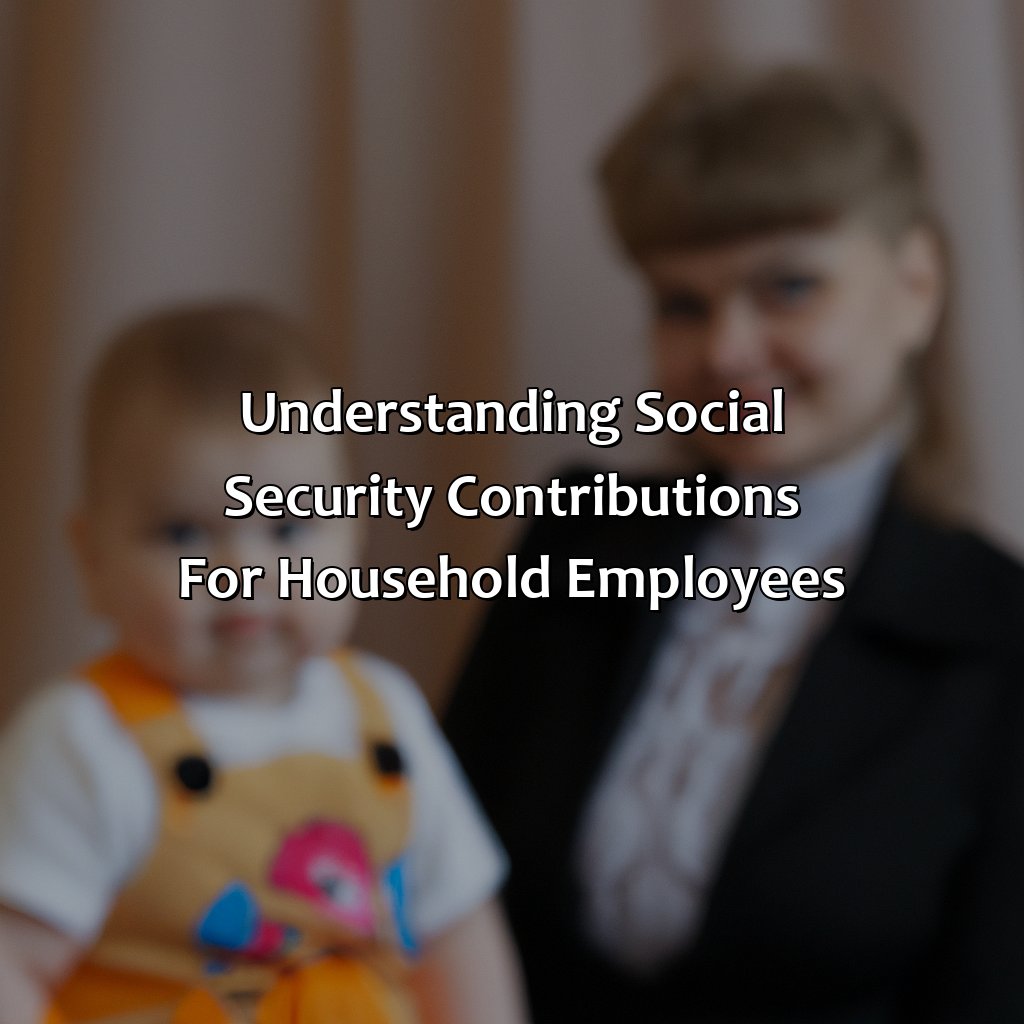How To Pay Social Security For Nanny?
Key Takeaway:
- Household employees, including nannies, are eligible for Social Security contributions: It is the employer’s responsibility to ensure that the required social security taxes are withheld and paid for their household employees, including nannies.
- Calculating Social Security taxes for nannies requires determining the correct tax rate and the nanny’s wages: The Social Security tax rate is currently set at 6.2% of the nanny’s gross wages, up to a certain limit. Employers must first determine the nanny’s gross wages in order to properly calculate and withhold the correct amount.
- Employers should be aware of other legal and tax considerations beyond just Social Security contributions, including state tax requirements and wage and hour laws: Failing to comply with these regulations could result in penalties and legal issues. Employers should do their due diligence and stay informed on all relevant regulations and laws.
Are you struggling to figure out how to pay social security for a nanny? You’re not alone. This article explores all the steps to properly pay social security taxes, ensuring you remain compliant with the law.
Understanding Social Security Contributions for Household Employees
Do you need to know the legal requirements of paying social security for your nanny? This section will help you. We will introduce two sub-sections:
- The first one is ‘Who is Considered a Household Employee?‘
- The second one is ‘What are the Employer’s Obligations?‘
Thus, you’ll get to understand the social security contributions for household employees, such as nannies.

Image credits: retiregenz.com by Harry Arnold
Who is Considered a Household Employee?
Household employees are individuals employed directly by a household to perform domestic services like cleaning, cooking, and caring for children or elderly members. Babysitters, nannies, housekeepers, and caretakers are all examples of household employees. The worker must be under the control of the employer with regards to the duties performed and their schedule. It should be noted that temporary workers such as plumbers or electricians hired for a specific job are not considered household employees.
When employing a household worker, it is important to determine if they are considered an employee according to the IRS guidelines. This involves examining if you have control over their work and if you provide them with the necessary tools to complete their job. If the answer is yes, then you must pay Social Security and Medicare taxes for your employee. Failure to do so can result in hefty fines.
It is advisable to keep accurate records of your employee’s wages and tax payments throughout the year. This can be done using Form W-2 or Schedule H attached to your annual tax return.
To make payments towards Social Security and Medicare taxes for your domestic employee during the year, use Form 1040-ES. Alternatively, pay using EFTPS (Electronic Federal Tax Payment System).
Remember that these payments benefit your employee by providing them with future Social Security benefits in case they become disabled or retire later in life. So paying these taxes not only fulfils your legal obligation but also provides long-term benefits for your caregiver.
Overall, when managing household employees, it’s important to understand who qualifies, what you need to do when employing one and how social security contributions work with relation to this type of employment. Being an employer means you have obligations, but they’re not as bad as having a nanny who knows all your secrets.
What are the Employer’s Obligations?
For household employees, the employer must contribute to Social Security. This includes nannies, caretakers, and more.
The obligations of the employer include paying both the employer and employee’s share of Social Security taxes, handling tax forms and filing them on time. It is crucial to understand these obligations to avoid legal issues and ensure a smooth payment process.
To pay these contributions, employers must obtain an Employer Identification Number (EIN) from the IRS. They must then fill out Form SS-4 for this purpose. Employers must also have their employee complete Form W-4 to determine the amount of Social Security tax to withhold from their earnings. These tax forms need to be filed regularly, either quarterly or yearly.
Employers who do not comply with their obligations may face costly penalties and legal consequences. It is also essential to keep clear records of all payments made with a recordkeeping system in place.
One reported instance involved a New York City attorney who neglected to pay Social Security taxes for his child’s nanny for several years. The Internal Revenue Service (IRS) made him pay nearly $200,000 in back taxes and fees as fines. It serves as a warning that employers should take their obligations seriously and avoid making similar mistakes.
Why settle for just doing math when you can calculate the social security taxes for your nanny?
Calculating Social Security Taxes for Nannies
Calculating Social Security Taxes for Nannies? You’ve come to the right place!
We’ll help you work out how much to pay.
- First, Determine their wages.
- Second, Understand the Social Security Tax Rate.
We’ll make sure you meet your legal obligations as an employer.

Image credits: retiregenz.com by Joel Arnold
Determining the Nanny’s Wages
Determining the Nanny’s Compensation
Calculating the salary of your nanny can be overwhelming, but it is crucial to determine their wages and stick to them. To do so effectively, consider various factors such as their experience, location, responsibilities, and working hours. By evaluating these points, you can negotiate a fair wage agreement that works for both parties.
It’s also essential to check rates in your area from caretaking platforms and agencies while designing a package that coincides with fair market values. This will act as a reliable guide in determining the wage rates for your nanny.
When setting payment options for your nanny, ensure you explain that their payment happens on an hourly basis or otherwise stated in their contract. This avoids any confusion on hourly counts.
Getting a good grasp on the Social Security Tax Rate is like trying to solve a Rubik’s Cube with a blindfold on.
Understanding the Social Security Tax Rate
The calculation of social security taxes for nannies depends on numerous factors, for example, income and minimum wage rates. Generally speaking, the social security tax rate is the percentage of an individual’s income that must be paid towards social security taxes. These taxes can be calculated using detailed guidelines provided by relevant government agencies.
One important thing to remember is that the social security tax includes both the employer and employee contribution. Therefore, if you are hiring a nanny, it is your responsibility as an employer to ensure that both you and your employee contribute equally to the social security tax fund.
It is also worth noting that the actual percentage of social security taxes may vary depending on numerous factors like age group, disability status etc. Thus it is mandatory to have a thorough understanding of these nuances when calculating social security taxes for nannies.
A true story about this topic highlights how in 1935, Social Security became part of President Franklin D. Roosevelt’s New Deal package aimed at opening up more job opportunities for Americans during the Great Depression era. However, its sole purpose was not just job availability but also future financial securities provisions via payments benefiting retired workers with a monthly annuity for life after they reach full retirement age.
Your nanny may be a treasure, but don’t forget to pay their social security measure.
Paying Social Security Taxes for Nannies
Need to pay Social Security taxes for your nanny? We’ve got the scoop! Here, we’ll share details on registering as an employer with the IRS and when to file and pay. It’s important to follow these steps, so you can contribute to your nanny’s social security benefits, and also obey the law.

Image credits: retiregenz.com by James Woodhock
Registering as an Employer with the IRS
When becoming an employer with the IRS, you need to take certain steps to ensure that you comply with all required regulations. It is essential to register as an employer and set up your account for paying taxes. Here’s how you can do it:
- Obtain an Employer Identification Number (EIN) for tax purposes through the IRS website.
- Establish a state unemployment tax account
- Determine if you are subject to federal or state employment taxes
- Verify worker eligibility documents and complete a Form I-9
- Provide your employees with a Social Security Number or W-4 form so they can fill out their correct tax withholding information.
- File your payroll tax returns on time and make electronic payments for all applicable taxes using EFTPS.
Remember that being a good employer means keeping up-to-date records, tracking hours worked, paying hourly wages in compliance with minimum wage laws, making necessary deductions from salaries, providing employee benefits where possible and following health and safety regulations.
If working parents hire nannies or caregivers who earn more than $2,200 per year, then parents may be responsible for paying social security taxes based on their nanny’s salary. Parents that pay at least $2,200 annually may end up owing social security taxes of up to 15.3% of their nanny’s salary.
For example, Rachel had two young children and worked full-time at a law firm. When her husband passed away suddenly, she needed the help of a nanny to care for her children while she was at work. Rachel did not realize that she was required by law to withhold social security taxes and Medicare contributions. The government eventually fined Rachel when it discovered her noncompliance but she learned from her mistake and paid extra attention in managing the legal requirements involved in hiring nannies from then onward.
Better pay those nanny taxes on time, unless you want the IRS knocking on your door like an overeager babysitter.
Filing and Payment Deadlines
When it comes to the timely payment of social security taxes for nannies, a lot of individuals are unsure about the right filing and payment deadlines. To help you stay on top of your obligations as an employer, we have compiled a comprehensive guide.
The table below summarizes the filing and payment deadlines for all employers, including those who have employed nannies.
| Quarter | Filing deadline | Payment deadline |
|---|---|---|
| 1 | April 30 | April 30 |
| 2 | July 31 | July 31 |
| 3 | October 31 | October 31 |
| 4 | January 31 | January 31 |
It’s important to note that if you don’t meet these deadlines, you may be subject to penalties and interest charges. Additionally, failing to pay these taxes can also impact your nanny’s eligibility for social security benefits in the future.
While there are a few unique details that vary from state to state, this table provides the general guidelines for paying social security taxes for nannies.
Don’t let the fear of missing out on payments or facing penalties stop you from fulfilling your responsibilities as an employer. Use this guide to ensure that you meet all relevant deadlines and avoid any unnecessary stress.
Don’t forget to budget for the occasional therapy session after realizing how much you’re spending on social security taxes for your nanny.
Other Considerations for Paying Social Security for Nannies
Make sure you pay social security for your nanny correctly!
Remember that there’s more than just federal tax laws to keep track of. This section gives more info on ‘Other Considerations for Paying Social Security for Nannies.’ Two key things to think about:
- State Tax Requirements
- Wage and Hour Laws

Image credits: retiregenz.com by Adam Woodhock
State Tax Requirements
When it comes to paying State Taxes for nannies, there are certain requirements you need to meet. You must comply with the state’s labor laws, which differ from state to state. Some states mandate that employers withhold taxes on nannies’ wages, while others do not. To ensure compliance, research your local regulations or consult with a payroll service provider.
It’s also crucial to understand whether your nanny is an employee or an independent contractor under state law. If classified as an employee, you may be required to provide workers’ compensation and disability insurance in some states. Independent Contractors do not require withholding taxes as they file a form 1099 annually.
One essential factor in managing taxes is keeping records of compensation paid and tax liabilities accrued each year. Make sure you track every payment carefully so that you don’t miss out on any deductions or credits.
Pro Tip: It’s better to work with a licensed payroll services provider who can manage everything related to paying Social Security Taxes for your Nanny ensuring complete compliance of all State and Federal Laws.
Remember, paying your nanny fairly isn’t just a suggestion – it’s the law. And breaking the law is a nanny-go!
Wage and Hour Laws
When it comes to paying social security for nannies, employers must ensure they comply with laws around wages and hours. This includes providing regular pay stubs, making sure the nanny is paid at least minimum wage, and adhering to overtime rules. Failure to abide by these regulations can lead to legal consequences.
Moreover, certain jurisdictions may have additional regulations to follow. For example, some states require a specific number of rest breaks during working hours. It’s important that employers are familiar with the laws in their area to prevent any potential issues.
In a landmark case in 2015, a family was ordered to pay over $800,000 in back wages and damages after failing to comply with wage and hour laws related to their nanny’s pay. This serves as a reminder of the importance of proper payment practices when hiring domestic employees.
Five Facts About How To Pay Social Security For Nanny:
- ✅ If you pay a nanny more than $2,300 a year, you’re required to pay employer taxes, including Social Security taxes. (Source: Care.com)
- ✅ You’ll need to obtain an Employer Identification Number (EIN) from the IRS before you can pay Social Security for your nanny. (Source: Nanny Lane)
- ✅ Social Security taxes for nannies are 6.2% of the nanny’s gross pay. (Source: The Spruce)
- ✅ You’ll need to report and pay Social Security taxes quarterly using Form 1040-ES. (Source: TurboTax)
- ✅ Failing to pay Social Security for your nanny could result in penalties and fines from the IRS. (Source: H&R Block)
FAQs about How To Pay Social Security For Nanny?
How do I pay social security for my nanny?
To pay social security for your nanny, you will need to register for an employer identification number (EIN) from the IRS and set up a payroll system. You will also need to withhold the nanny’s portion of social security taxes from their wages and match that amount as the employer. Make sure to file quarterly tax forms and annual W-2 forms as well.
Do I have to pay social security for my nanny?
If you pay your nanny $2,300 or more in a calendar year, you are required to pay social security taxes on their behalf. The current social security tax rate is 6.2% for both the employee and employer portion, so the total tax rate is 12.4%.
Can I pay social security taxes for my nanny on my own?
While you can technically pay your nanny’s portion of social security taxes on their behalf, it is not recommended. This could be viewed as tax evasion and may result in penalties. It is best to withhold the nanny’s portion from their wages and match it as the employer.
What if my nanny is an independent contractor?
If your nanny is an independent contractor rather than an employee, you do not need to pay social security taxes on their behalf. However, make sure to correctly classify them as an independent contractor and not an employee to avoid legal issues.
What happens if I don’t pay social security for my nanny?
If you do not pay social security taxes for your nanny, you could face penalties and fines from the IRS. You may also jeopardize your nanny’s ability to collect social security benefits in the future. It is important to follow all tax laws and regulations when hiring household employees.
Can I get help with paying social security for my nanny?
Yes, there are several resources available to help you with paying social security taxes for your nanny. You can hire a payroll service, accountant, or tax professional to assist you with tax filings and withholdings. You can also contact the IRS or Social Security Administration for assistance.


